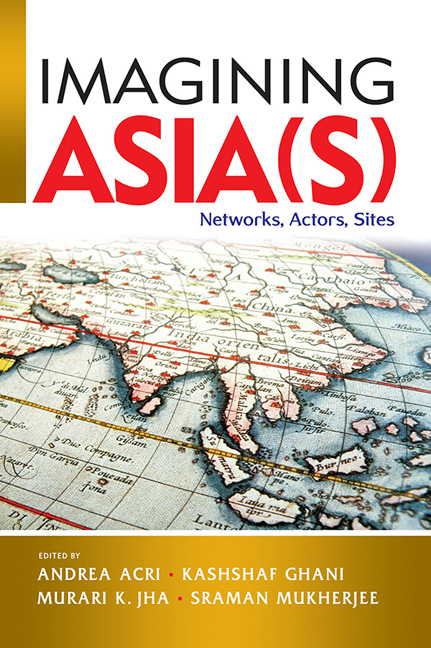Book contents
- Frontmatter
- Contents
- List of Contributors
- Introduction
- Part I Conceptualizing the Region: Past and Present
- Part II Conceptualizing Asia through the Prism of Europe
- Part III Networks of Knowledge Across the Indian Ocean
- Part IV Histories and Geographies of Pilgrimage in Asia
- 8 Transmissions, Translations, Reconstitutions: Revisiting Geographies of Buddha Relics in the Southern Asian Worlds
- 9 The Politics of Pilgrimage: Reception of Hajj among South Asian Muslims
- Part V Trans-Local Dynamics and Intra-Asian Connections across Space and Time
- Index
8 - Transmissions, Translations, Reconstitutions: Revisiting Geographies of Buddha Relics in the Southern Asian Worlds
from Part IV - Histories and Geographies of Pilgrimage in Asia
Published online by Cambridge University Press: 31 January 2020
- Frontmatter
- Contents
- List of Contributors
- Introduction
- Part I Conceptualizing the Region: Past and Present
- Part II Conceptualizing Asia through the Prism of Europe
- Part III Networks of Knowledge Across the Indian Ocean
- Part IV Histories and Geographies of Pilgrimage in Asia
- 8 Transmissions, Translations, Reconstitutions: Revisiting Geographies of Buddha Relics in the Southern Asian Worlds
- 9 The Politics of Pilgrimage: Reception of Hajj among South Asian Muslims
- Part V Trans-Local Dynamics and Intra-Asian Connections across Space and Time
- Index
Summary
OWNERSHIP AND VALUES
In his note of 1909, the ethnologist Herbert Hope Risley, a member of the Legislative Department of the British Indian Government, argued on a rather irate note that “… Buddhist bones belong to nobody and have no value!”. The occasion was the proposed presentation of Buddhist relics, discovered from the site of Shah-ji-ki-Dehri near Peshawar (now in Pakistan), to the Buddhists of Burma. The situation was already complicated by competing demands of various communities and associations over the custody of these relics. To make matters worse for the government, the Afghan Muslim landowners of the site, the two brothers Sayed Amir Badshah and Sayed Ahmed Shah, claimed a share in the finds. They supported these claims by citing a prior agreement they had entered with the excavator, Dr David Brainerd Spooner, the Superintending Archaeologist of the Frontier Circle of the Archaeological Survey of India (henceforth, ASI). This agreement, the owners claimed, promised them an equal share in the finds and financial compensation for any loss to cultivation incurred during excavations. Asserting their landowner's rights, the Sayed brothers now claimed half the share of the total finds unearthed from the Dehri or its equivalent financial value from the Buddhists claiming a share of the relics.
The finds from the excavations included four bits of bones, a crystal reliquary, a clay seal intended to encase the bone fragments in the crystal reliquary, an inscribed metal reliquary housing all these objects, and an old coin. The decoding of inscriptions on the metal casket identified the bone fragments as authentic corporeal relics of the Gautama Buddha. For the antiquarians and archaeologists, the inscriptions, more importantly, attested the reliquary and the remains of the ancient stūpa (Buddhist funerary and/or commemorative mound) at the site of Shah-ji-ki-Dehri as the gift of the second-century monarch of the Kushan Dynasty, Kanishka (Asher 2012) (see Figures 8.1 and 8.2).
The situation created by such demand was entirely new for the colonial state. The problem of determining the price of centuries-old Buddhist bones unprecedented, and the Afghan Muslims were never seen to take any keen interest in Buddhist remains that abound throughout this region. In fact, beginning with the nineteenth century, Muslims in general, and especially Pathan Muslims of the Northwest Frontier region, were stereotypically represented in the colonial archives as ignorant native vandals, mischievous troublemakers, religious fanatics, and zealous iconoclasts.
- Type
- Chapter
- Information
- Imagining Asia(s)Networks, Actors, Sites, pp. 215 - 250Publisher: ISEAS–Yusof Ishak InstitutePrint publication year: 2019



